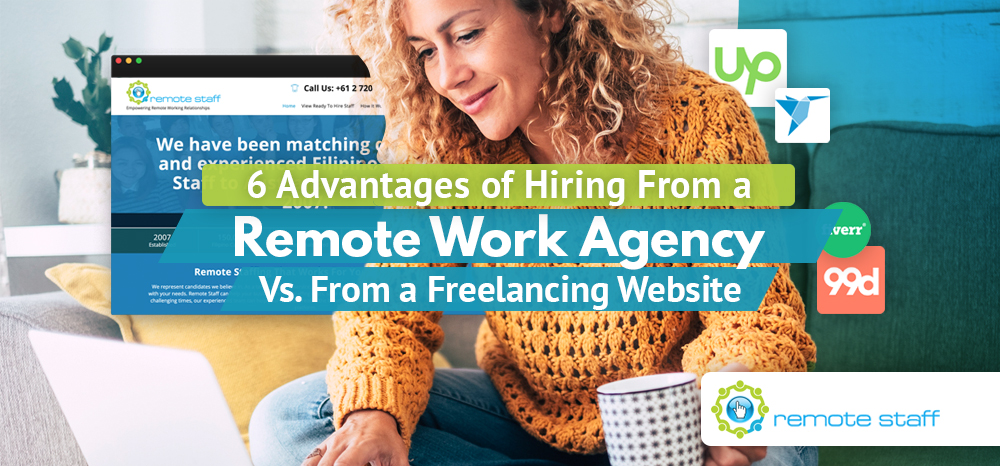Let’s say you’ve finally decided to hire your first remote worker. You’ve probably even figured out what sort of virtual assistant you need, as well as what qualities you’re looking for.
Now, there are generally three ways to hire remotely. First, you can post a job opening on your social media profiles. If you’ve got enough of a following in relevant communities or are connected to enough people in the remote work industry, this can work.
Second, there’s the ever-popular option of signing up as an employer on a freelancing website. This is a popular option, simply because signing up is free. Furthermore, lots of people post their applications on these websites, giving you plenty to choose from.
Lastly, there’s signing up with a remote work agency. Now, this option isn’t known to many, but it’s certainly picking up traction, especially among those who want to have a smoother experience when hiring remotely. Here’s why:
1. Streamlined Onboarding Processes.

Working from home is a lot trickier than it seems. While being able to work within proximity of your bed might sound like a dream, remote working also comes with its own set of challenges. You’d have to set up your own office, monitor your own Internet connection, figure out your ideal working schedule, and yes, discipline yourself not to give in to the endless distractions around you.
Many newbies who sign up to freelancing websites don’t know this. Thus, their clients end up paying the price while they muddle around finding their way. Remote work agencies, on the other hand, invest heavily in training accepted applicants in key WFH matters. These include using communications software, logging in their hours, and bridging any cultural differences with their clients.
2. Less Logistical Headaches.

Outsourcing remote talents often involve taking on workers from other countries. These entail a whole host of unique challenges. Conflicting time zones, bureaucratic red tape, and labyrinthine tax laws are just a few.
Not all freelancers or remote workers opt to comply with their country’s regulations (if these exist at all), but those who want employment benefits need to. Now, if you hire via a freelancing website, you’re pretty much on your own here. The sites simply connect talents to employers and vice versa, and little else.
With a remote work agency, however, they usually source their remote workers from one country. Thus, this allows them to get fully acquainted with that country’s laws and regulations, and most importantly, how to abide by or get around them so that their clients won’t have to.
I mean, come on, you’re hiring remotely to have more time, right? There’s no point using that spare time to puzzle over social security systems and taxation on the other side of the world.
3. Quality Over Quantity.

While it can be true that freelancing websites can have exponentially more applicants than remote work agencies, there’s a good reason for this.
Usually, freelancing websites only require applicants to complete their profiles before they publish them. They might require them to upload photos of government-issued ID’s or IQ exam scans, but they can’t really conduct thorough background checks. How can you do that when your applicants live all over the world?
As mentioned earlier, remote work agencies are better equipped to pre-qualify their applicants, especially if the back end of their operations are mostly located in one country. They also have enough staff that they can deploy solely to scrutinize each applicant’s profile before allowing them onto the platform.
4. Existing Communication and Compliance Monitoring Systems.

The success of your remote team depends a great deal on the strength of your policies. While working from home entails greater flexibility and autonomy, it still requires some structure.
For example, while you can be flexible about the start and end of everyone’s working hours, they should all be online at certain times to make communication easier. Also, everyone’s roles and daily tasks should be clearly defined.. As their boss, it would be up to you to come up with a way to check that these are being carried out.
When you hire on a freelancing website, you have to figure these things out on your own, and that can take a while, especially if you’re new to all this. If you go with a remote work agency, they’re likely to have policies and platforms already in place.
With Remote Staff, for instance, we already have software that monitors your remote workers’ online activities, saving you the trouble of shopping around for your own. Our pool of talents are also pre-qualified and briefed on WFH ground rules as part of the onboarding process.
5. A Compensation Process That’s Painless and Secure for Both Parties.

Ah, compensation. It remains a touchy subject in the workplace, and remote ones are no different. Whichever option you choose when hiring remote workers, transparency and integrity when it comes to their pay is key to a retention.
Sure, there’s PayPal, Transferwise, or other payment channels you can use if you hired your team from a freelancing website. With remote work agencies, on the other hand, you don’t even need to bother with your remote team’s banking details. The agency takes care of all that for you, ensuring that your workers are paid on time and with the correct amounts, regardless of currency fluctuations, banking holidays, and so on.
And we all know that well-paid workers usually turn out to be loyal and productive ones, right?
6. Personalized Customer Service.

This is perhaps the biggest advantage of hiring via a remote work agency. With Remote Staff, for example, you get your own Lead Account Officer.
What’s that, you ask? Well, as the name suggests, that’s someone who’s assigned to help you with any of your remote work concerns. Whether it’s assisting you with monitoring compliance or successfully resolving any work-related issues, they’ve got your back.
Wouldn’t that give you greater peace of mind?
Signing up with a Remote Work Agency might be costlier than most options, but it can definitely give you better value for your money. After all, it affords you peace of mind, and in a set-up where you can’t hover over your workers, that alone is worth every penny.
Serena has been working remotely and writing content for the better part of the last decade. To date, she's written for Pepper.ph and Mabuhay Magazine, among others, and has churned out more than a thousand articles on everything from The Basics of Stock Market Investing to How to Make Milk Tea-Flavored Taho at home.





















